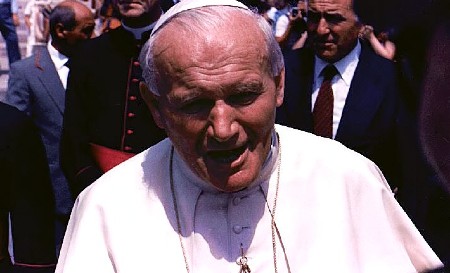We ask you, humbly: don't scroll away.
Hi readers, it seems you use Catholic Online a lot; that's great! It's a little awkward to ask, but we need your help. If you have already donated, we sincerely thank you. We're not salespeople, but we depend on donations averaging $14.76 and fewer than 1% of readers give. If you donate just $5.00, the price of your coffee, Catholic Online School could keep thriving. Thank you.Help Now >
Third Sunday of Easter: The Apostle Peter Teaches Us Lessons From Failure
Peter teaches us that failure is an opportunity to love better and stronger. By beginning again and again, failure is an opportunity to love God and neighbor even more. When you can truly love, you will never fear failure and sin, because failure and sin become opportunities to love even more intensely.
Highlights
Catholic Online (https://www.catholic.org)
4/16/2010 (1 decade ago)
Published in Lent / Easter
align="justify">CORPUS CHRISTI, TX (CATHOLIC ONLINE) - Every sin is a failure. However, there is a lot that we can learn every time we say no to the Lord. Every moment of sin is a moment to love more. During the Last Supper, Peter assured the Lord of his love. Nevertheless, Jesus predicted that he would deny him three times.
Sometimes pride causes us to sin. We feel confident that we can handle certain situations. Pride can even blind us from the memory of past experiences, and we fall in the same hole over and over again.
In this Sunday's gospel narrative, Jesus asks Peter three times if he really does love him. The triple profession of love that Peter makes after the Resurrection overcomes his threefold denial before the Passion.
When Peter denied the Lord, the Scriptures tell us that he went away and wept bitterly. Through repentance and compunction, Peter was able to mistrust his own abilities and put his trust entirely in the Lord. He discovered that left to his own abilities, he would continue to fall. However, united to the power of God's grace, he could overcome himself and persevere in fidelity.
There must be a reason why Jesus chose Peter to be the head of his Apostles. He trusted Peter and knew that he would return loving even more. Perfect people do not exist. God always chooses the weak in order to bring about great tasks. People who recognize their weaknesses, sinfulness and limitations are humble. Humility allows them to rely on God's grace and not on their own capabilities. The arrogant do not allow God to work in their lives, or through them, in the lives of others.
"Peter, do you love me"? Peter was asked this question three times. Three times Peter assured the Lord that he loved him, and three times Peter was commissioned to show his love by feeding the flock. This reminds us that love is not comprised of empty promises. Love is made manifest in giving ourselves to others.
Easter is all about the new way of life called Christianity. Feeding lambs and feeding sheep means that because of Jesus, we no longer can live for ourselves. We need to be kind to each other, affirm and encourage one another, serve and forgive one another.
Every saint has a past, and every sinner has a future. Many of the greatest saints of the Catholic Church were at one time great sinners. Simply consider the sins of David, Magdalen, Paul and Augustine. Nevertheless, they, like many others, were able to turn their lives around and love even more.
This Sunday's gospel passage reminds us that our own personal sin is never the end of the story. Every day God gives us a blank piece of paper to write the history of a new day.
"Peter, do you love me?" Jesus asks us the same question: Do you love me? Every day, we have many moments to show Jesus how much we really do love him.
"Peter, do you love me more than these?" Do you love me more than your possessions? Do you love me more than your money? Do you love me more than your house? Do you love me more than your spouse, your children, your mother and your father? Do you really love me more than yourself?
Unless we are able to go into the desert, which is a terrible and difficult journey, we will never experience true love. And why is this true? This is true because in order to really love the way Jesus call us to love, we must truly die to ourselves. Only those who are free from any attachment, any obsession and any addiction can truly love. When you really die to yourself, love possesses you. When you can truly love, you will never fear failure and sin, because failure and sin become opportunities to love even more intensely.
For all those who call themselves disciples of Jesus, failure is an opportunity to love better and stronger. By beginning again and again, failure is an opportunity to love God and neighbor even more.
-----
Father James Farfaglia is the pastor of Saint Helena of the True Cross of Jesus Catholic Church in Corpus Christi, Texas. Father has a hard hitting blog called Illegitimi non carborundum. He has also published a book called Man to Man: A Real Priest Speaks to Real Men about Marriage, Sexuality and Family Life. He is a contributor to Catholic Online.
---
'Help Give every Student and Teacher FREE resources for a world-class Moral Catholic Education'
Copyright 2021 - Distributed by Catholic Online









 Daily Readings for Thursday, April 25, 2024
Daily Readings for Thursday, April 25, 2024 St. Mark: Saint of the Day for Thursday, April 25, 2024
St. Mark: Saint of the Day for Thursday, April 25, 2024 Prayer for Policemen: Prayer of the Day for Thursday, April 25, 2024
Prayer for Policemen: Prayer of the Day for Thursday, April 25, 2024


